We all grow older. People and dogs alike. But you might be surprised to know that there are quite a few similarities between aging dogs and aging humans. I’m not saying that our furry friends worry about premature hair loss or having enough money to retire, but they do face some of the same challenges in growing older. Things such as decreased mobility, changes in behavior, loss of cognitive function and weight gain. Recognizing and understanding how a dog ages can help us improve its quality of life.
Caring for Your Senior Dog
Growing old gracefully
We all want to grow old gracefully and with dignity. Our furry friends are no different. Even though they have slowed down markedly, they have a great need to continue to feel important to the family. With declining mobility, they may not be able to get up and go as they did in their younger years, but they still want to protect and defend their human counterparts. As owners, we should speak to them with love and encouragement. New research shows that dogs process both what we say and how we say it in a way that is amazingly similar to how humans process words. This means that dogs can recognize meaningful words vs. meaningless sounds. Senior dogs have been longtime, loyal servants who deserve our love and respect.
Oh, my aching back
Joint pains plague our senior canines just as they do us. And, arthritis and joint problems start long before we see physical signs of pain. By the time we spot limping or yelping, we have waited too long. We should be watching for signs of joint decline before this happens. Watch for things like how fast or slow your dog gets up. If your dog is not eager to get up or it takes longer than usual, it’s a pretty good sign that their joints ache. Also, if your dog is reluctant to walk, run or climb stairs, or sits or stops walking when you take him outside, this is another sign that they could be in pain. One thing that can be helpful is to put them on a high-quality joint supplement. You don’t need to wait until your dog is in pain to start them, in fact, they work best when started earlier. Talk to your vet about what kind of supplement is best for your dog.
Don’t bug me kid
It’s not uncommon for older dogs to become irritable or bad-tempered. They may not want you to pet them, become aggravated with other pets or puppies, and may not tolerate visitors or small children in the home. I had a grandfather who behaved much in this same fashion and seemed happiest when he was yelling at kids to get off his lawn! It is important, however, to understand why your old friend has become so grumpy.
Several factors could be at play. First, they could be in pain or discomfort from a degenerative condition or chronic health problem. Second, they could be suffering from fear or anxiety just as many aging adults do. Third, they may be dealing with cognitive dysfunction or “doggie dementia.” This is similar to Alzheimer’s disease in humans. And, fourth, they could be dealing with a loss of the senses such as sight or hearing.
It is highly recommended that you visit your vet when dealing with these types of issues. They can help identify any underlying medical issues that might be causing your senior dog’s bad temper.
Tipping the scales
It’s no secret that we gain weight as we age. Dogs, like us, often get less exercise yet continue to eat the same quantity of food. Also, a few too many treats or sharing “people food” can compound the problem. If your dog seems healthy but has gained a few extra pounds it is most likely a result of these factors. Paying attention to what kind of food and how much we are feeding our senior dog will typically solve the problem. Be sure to choose the right kind of food for their size and activity level.
Also, it can be beneficial to add age-appropriate exercise like short walks. No matter how old a dog is, they always look forward to a walk. Remember that you may need to take shorter walks and make frequent stops for rest. Swimming can also be beneficial if your dog enjoys the water. It is good because it puts less stress on sore joints.
If you notice sudden, unexplained changes in weight or notice additional signs that your dog is unwell, they should be checked out by a veterinarian. Weight change can be caused by other factors such as stress, medications, type of dog breed, and even medical conditions such as diabetes or thyroid disease.
Enjoy the golden years
When caring for senior dogs, it is important to remember that they age much as we do. Keeping this in mind makes it easier for us to relate to them and understand their needs. As they approach their golden years, their quality of life can be extended by paying attention to their changing habits and behaviors. In this manner, you can feel confident in caring for your good old dog. And, as always, continue to treat them with kind reassurance and love.
Pin it!

Photo courtesy pixabay/StockSnap


 View All Posts by Barb Bauer
View All Posts by Barb Bauer